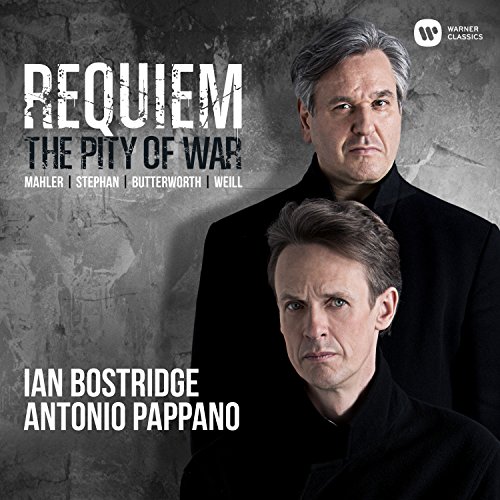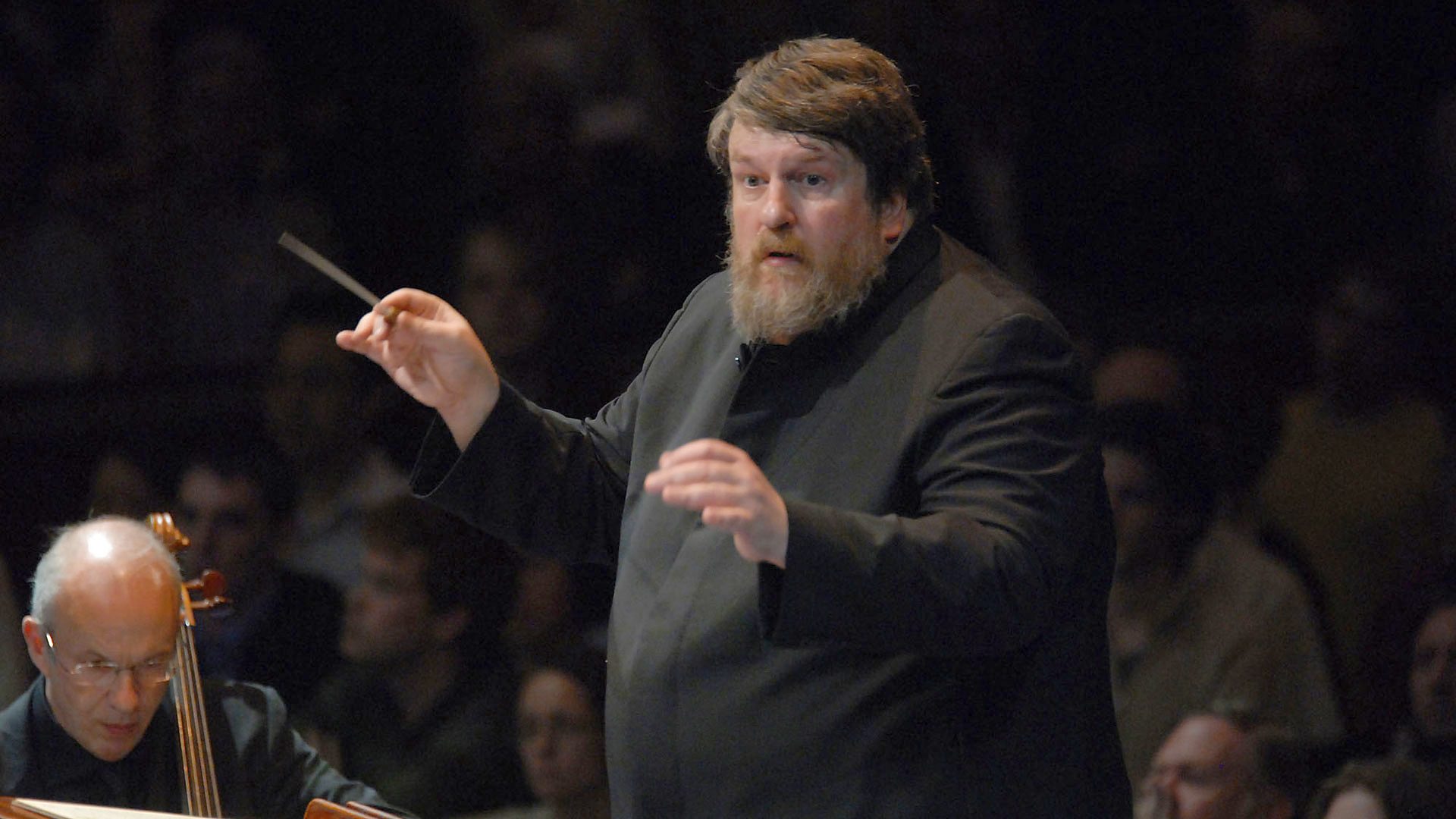"Requiem: the Pity of War with Ian Bostridge and Antonio Pappano. The inspiration came from Benjamin Britten's War Requiem, which Bostridge has done numerous times. Britten's War Requiem," he writes "seems to express in art Winston Churchill's notion of the 1914-18 conflict as the initiator of the 20th century's own Thirty Years War" since it spans the First and Second World Wars, blending the poetry of Wilfred Owen, poet of the trenches and the spirit of reconciliation that motivated the commission marking the rebuilding of Coventry Cathedral. Thus the quotation from Owen, "My subject is War, and the Pity of War". "How might one reflect the experience and significance of the conflict" writes Bostridge "in a song recital ?". The answer might be this excellent programme, with interesting repertoire choices and approaches to more familiar material. Bostridge and Pappano, whose partnership is long and fruiful, are doing this recital live at the Barbican Hall on December 5th. The recording, from Warner Classics, is now available, well produced with good illustrations.
Bostridge and Pappano begin with George Butterworth's Six Songs from A Shropshire Lad, perhaps th best known English song cycle with a connection to war, given that Butterworth was killed in the Somme in August 1916. Housman's poems were published in 1896 : the war they pertain to might be the Boer War, or colonial wars, but the connotations are not specifically military. They deal with more generalized concepts of youth and death, impermanence and loss. Even though Butterworth collected folk song, a quasi-folk song approach doesn't necessarily apply. Bostridge and Pappano demonstrate an art song approach, which may at first seem unsettling, but works on a more esoteric level In "When I was One and Twenty" the last words "'tis true, 'tis true" are held open ended, suggesting possibilities beyond text. If the dynamic lines in "Look not into mine Eyes" are more extreme than usual, this emphasizes the unease that lies behind the poem : the lad "that many loved in vain" does not reveal himself, to anyone. "A Jonquil, not a Grecian Lad". "Is my team ploughing" feels decidedly supernatural.
This disc is worth getting, though for a superlative performance of Rudi Stephan’s song cycle Ich will dir singen ein Hohelied. Stephan was an extremely promising composer as his best-known works, the two Musik für Orkester in einem Satz attest, his opera Der ersten Mensch being a prototype of Expressionist music theatre. The six songs in this cycle, to poems by Gerda von Robertus (1873-1939) inhabit a world much closer to aesthetics of the period when exoticism was heightened by an awareness of the dangers of the subconcious. The poems are terse aphorisms, Stephan's settings concise. The nearest equivalent might be Alban Berg's Altenberg-Lieder, also from the same period (1911-12) In "Kythera", "Der Rosen Düfte liebeatmend schwingen in welchen Weilen" while the sound of aoelian harps drifts from afar. The setting floats gently, held sotto voce. In "Pantherlied" the piano line ripples, suggesting pent-up animal energy. The text in "Abendfrieden" is little more than a series of broken phrases which Stephan uses to create a song so delicate that it seems to hover in stillness. This oscillation occurs also in individual words like "Sonnenfeuer" which need careful shaping, but Bostridge captures the right vulnerabilty. "In Nachbars Garten duftet" describes a linden tree, which shivers "dammerlauschig kühl". Yet this is no pastoral. Lovers embrace, but why do the poet's eyes "overflow in burning pain"? The song is as magical as a song by Hugo Wolf, but with a kick in the tail. The mood of secrecy continues in "Glück zu Zweien" where "in the hubbub of the crowd, we found the silence of shared feeling". The vocal line stretches and curls, twining like "Zwei Könige wir, die finden das Reich ihrer Einsamkeiten". Throughout this cycle, tension has been building up, which finds release in the final song "Das Hohelied der Nacht". Yet again Stephan observes the fragmented nature of the phrases, using them to proceed rapidly to the last line "Du küsst es mir vom Munde", which rises like a cry of sudden triumph. These songs are miniature masterpieces and are done reasonably often, but Bostridge brings out the inner musical logic better than anyone else, with his intuitive feel for meaning and the curling, curving timbre of his voice. Incidentally, Stephan died in strange circumstances. The night before he died, he could not sleep, surrounded by the agonized cries of the wounded all around. In the early hours of the morning, he stood upright in his trench at Tarnopol in Galicia on the Eastern Front, and shouted "Ich halte es nicht aus!" and was promptly shot by a sniper. He was barely 28.
From the sophistication of Rudi Stephan to the relative straightforwardness of Kurt Weill's Four Walt Whitman Songs. Bostridge varies the marching rhythms in "Beat ! Beat ! The Drums" with articulation that twists in protest. If "Captain ! My captain !" is a strophic ballad, "Come up from the Fields, my Father, there's a letter" is dramatic, delivered here with appropriate portent. The military antecedents of "The Dirge for Two Veterans" are impeccable. Gustav Holst set this text ("The Last Sunbeam") in 1914, and it was also set by Vaughan Williams (in Dona Nobis Pacem). Weill wrote these songs after Pearl Harbor, when the United States joined the Second World War. Like Britten's War Requiem, they help this Bostridge and Pappano programme bridge two World Wars.
Three songs from Mahler's Des Knaben Wunderhorn conclude the programme. Again, these are not folk songs, but art songs. Significantly, the songs chosen here are ghost songs, which suit a singer who is a superlative Peter Quint. In "Revelge", skeletons march through a town at night, and "Der Tambourg'sell" is a death knell, Pappano's piano "drumming" as Bostridge's voice rises to near-scream before descending to the low rumble of the refrain "Gute Nacht". Best of all, though, is "Wo die Schöne Trompeten blasen" where Bostridge and Pappano capture the spookiness that pervades the song even before the girl knows what's going on. She, too, will die before the year is over.









